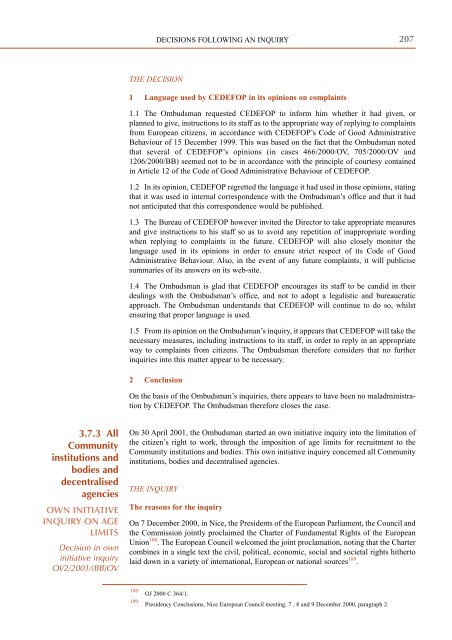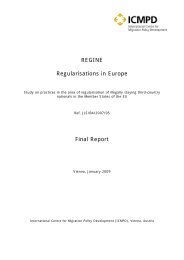Annual report 2002 - EOI
Annual report 2002 - EOI
Annual report 2002 - EOI
Create successful ePaper yourself
Turn your PDF publications into a flip-book with our unique Google optimized e-Paper software.
DECISIONS FOLLOWING AN INQUIRY 207<br />
THE DECISION<br />
1 Language used by CEDEFOP in its opinions on complaints<br />
1.1 The Ombudsman requested CEDEFOP to inform him whether it had given, or<br />
planned to give, instructions to its staff as to the appropriate way of replying to complaints<br />
from European citizens, in accordance with CEDEFOP’s Code of Good Administrative<br />
Behaviour of 15 December 1999. This was based on the fact that the Ombudsman noted<br />
that several of CEDEFOP’s opinions (in cases 466/2000/OV, 705/2000/OV and<br />
1206/2000/BB) seemed not to be in accordance with the principle of courtesy contained<br />
in Article 12 of the Code of Good Administrative Behaviour of CEDEFOP.<br />
1.2 In its opinion, CEDEFOP regretted the language it had used in those opinions, stating<br />
that it was used in internal correspondence with the Ombudsman’s office and that it had<br />
not anticipated that this correspondence would be published.<br />
1.3 The Bureau of CEDEFOP however invited the Director to take appropriate measures<br />
and give instructions to his staff so as to avoid any repetition of inappropriate wording<br />
when replying to complaints in the future. CEDEFOP will also closely monitor the<br />
language used in its opinions in order to ensure strict respect of its Code of Good<br />
Administrative Behaviour. Also, in the event of any future complaints, it will publicise<br />
summaries of its answers on its web-site.<br />
1.4 The Ombudsman is glad that CEDEFOP encourages its staff to be candid in their<br />
dealings with the Ombudsman’s office, and not to adopt a legalistic and bureaucratic<br />
approach. The Ombudsman understands that CEDEFOP will continue to do so, whilst<br />
ensuring that proper language is used.<br />
1.5 From its opinion on the Ombudsman’s inquiry, it appears that CEDEFOP will take the<br />
necessary measures, including instructions to its staff, in order to reply in an appropriate<br />
way to complaints from citizens. The Ombudsman therefore considers that no further<br />
inquiries into this matter appear to be necessary.<br />
2 Conclusion<br />
On the basis of the Ombudsman’s inquiries, there appears to have been no maladministration<br />
by CEDEFOP. The Ombudsman therefore closes the case.<br />
3.7.3 All<br />
Community<br />
institutions and<br />
bodies and<br />
decentralised<br />
agencies<br />
OWN INITIATIVE<br />
INQUIRY ON AGE<br />
LIMITS<br />
Decision in own<br />
initiative inquiry<br />
OI/2/2001/(BB)OV<br />
On 30 April 2001, the Ombudsman started an own initiative inquiry into the limitation of<br />
the citizen’s right to work, through the imposition of age limits for recruitment to the<br />
Community institutions and bodies. This own initiative inquiry concerned all Community<br />
institutions, bodies and decentralised agencies.<br />
THE INQUIRY<br />
The reasons for the inquiry<br />
On 7 December 2000, in Nice, the Presidents of the European Parliament, the Council and<br />
the Commission jointly proclaimed the Charter of Fundamental Rights of the European<br />
Union 108 . The European Council welcomed the joint proclamation, noting that the Charter<br />
combines in a single text the civil, political, economic, social and societal rights hitherto<br />
laid down in a variety of international, European or national sources 109 .<br />
108<br />
109<br />
OJ 2000 C 364/1.<br />
Presidency Conclusions, Nice European Council meeting, 7 , 8 and 9 December 2000, paragraph 2.
















